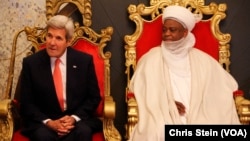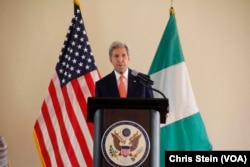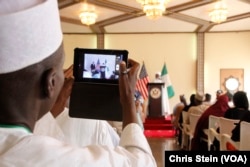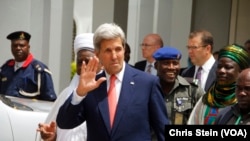Religiously motivated extremist groups like Boko Haram will only be stopped when governments cut down on corruption and offer opportunities to their young people, U.S. Secretary of State John Kerry said during a visit with Nigeria’s top Muslim leader on Tuesday.
Kerry's visit to Nigeria -- his third and likely last as secretary of state -- comes as the country grapples with an impending economic recession and a number of security crises.
Speaking at the palace of Sultan of Sokoto Sa'adu Abubakar, the top Muslim leader in Nigeria, Kerry said it is up to governments to give people a reason not to join extremist movements.
“To win the struggle for the future, nations need to do more than just denounce bankrupt dead-end ideologies that the terrorists support. They also have to offer their citizens an alternative that is better,” Kerry said. “There is nothing more demoralizing, more destructive, more disempowering to a citizen than the belief that the system is rigged against them.”
Boko Haram
He condemned Boko Haram, which has killed more than 20,000 people and displaced as many as 2.7 million in its more than seven years of fighting for strict Islamic law in northern Nigeria.
“Boko Haram boasts no agenda other than to murder teachers, burn books, kidnap students, rape women and girls, and slaughter innocent people, most of whom are Muslims,” Kerry said.
While the military has made progress against Boko Haram, the fighting has put millions of people at risk of starvation in the war-ravaged northeast.
Kerry linked the fight against groups such as Boko Haram to Nigeria’s long-running struggle to curb the corruption that analysts say keeps most of its 170 million people living in poverty.
Corruption is a priority of President Muhammadu Buhari, who won office last year on promises to change the way of doing business in one of Africa’s top economies.
The president reiterated his anti-corruption stance at a meeting with Kerry in the capital, Abuja.
“We will retrain our staff, so that they understand the new orientation. And those who run afoul of these rules will be prosecuted, no matter who is involved,” Buhari said.
Anti-graft efforts
While some observers say the Buhari administration has broken campaign promises and hasn’t put sufficient reforms in place to crack down on looters, Kerry said the U.S. supports the administration’s anti-graft efforts.
“Already, President Buhari is working with civil society to encourage official transparency and accountability. It is so important to restoring trust among the people,” Kerry said.
Jibrin Ibrahim, a fellow at the Center for Democracy and Development, said Kerry’s speech was mostly about keeping up appearances, but gave little indication of the path ahead for relations between the two countries.
“He gave assurances of continuing support but that’s sort of a normal support,” Ibrahim said. “[There were] no new developments that I was able to notice.”
Kerry did issue a veiled warning to Nigeria’s military, which has long been accused of carrying out atrocities.
Amnesty International and Human Rights Watch have issued numerous reports saying soldiers have tortured Boko Haram suspects and gunned down members of a separatist group and a Shi'ite Muslim sect.
Those allegations are one reason the U.S. has blocked weapons sales to Nigeria.
“It is understandable that in the wake of terrorist activity, some people are tempted to crack down on everyone and anyone who could theoretically pose some sort of a threat,” Kerry said. “Extremism cannot be defeated through repression or just creating fear.”
'Fatally wounded'
Shortly before Kerry's arrival, Nigeria’s Air Force on Tuesday claimed to have “fatally wounded” Boko Haram leader Abubakar Shekau and several other high-ranking members of the group in air strikes carried out against the terrorist organization’s headquarters.
Sani Usman, a spokesman for the Nigerian Air Force said in a statement that Shekau was “fatally wounded in the shoulder” when government planes bombed the Boko Haram jungle stronghold in the Sambisa Forest Friday.
Other Boko Haram leaders killed in the raid, including Abubakar Mubi, Malam Nuhu and Malam Hamman, Usman said. Several others were confirmed wounded.
Nigeria has previously claimed to have killed Shekau, but those claims were later thrown into doubt when video surfaced showing a man claiming to be Shekau alive and well.
Usman’s statement didn’t provide any further details about Shekau’s death. Boko Haram did not immediately respond to the claims.














